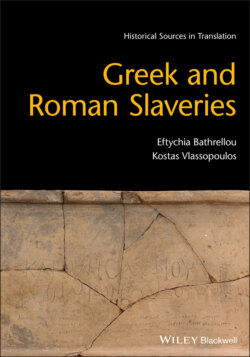Читать книгу Greek and Roman Slaveries - Eftychia Bathrellou - Страница 21
1.10 Ps.-Xenophon, Constitution of the Athenians, 1.11–2:17 Greek Political Treatise (Probably Fifth Century BCE)
ОглавлениеThis text, while critical of Athenian democracy, attempts to offer a sociological analysis of why the Athenian system works and is difficult to overthrow.
Literature: Vlassopoulos 2007; Canevaro 2018.
If anyone is also surprised at the fact that here they allow their slaves to live in luxury and, some of them, magnificently, they could be shown to be doing this too with good reason. For where there is a naval power, it is necessary for financial reasons to be slaves to the slaves − so that we may receive the payments (apophora) the slaves make − and then to let them free. “But in Lacedaemon, my slave would have been in fear of you!” But if your slave is in fear of me, there will be a risk that he might even give his money so as not to be in danger. Where there are wealthy slaves, it is no longer useful that my slave should be in fear of you. This is why we established equality of speech between slaves and free men and between metics and citizens.
How does the author describe the condition of slaves at Athens?
How does he explain the peculiar condition of Athenian slaves?
Do you find his explanation credible? What is the author’s agenda?
Why would a Spartan helot fear a free man who is not his master more than an Athenian slave would?
Can we say that Spartan helots behaved more slavishly than Athenian slaves?
Can we say that some Athenian slaves worked and lived as independently as most Spartan helots?
In the light of this and the above passages, does it make sense to posit a single categorical distinction between helots and chattel slaves?
